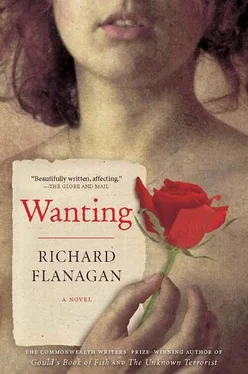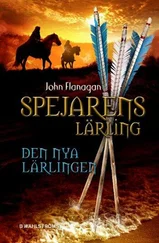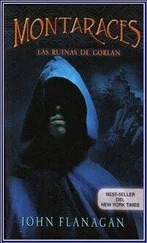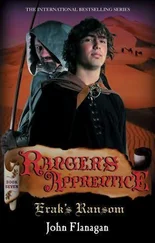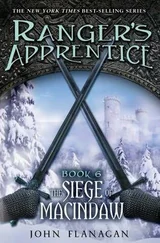To delay that fall a few moments more, he tried to lift himself back up by talking of his next amateur theatrical, which he staged every new year at Tavistock House. Family and servants and friends stood in for actors. Money from the tickets was given to one worthy cause or another, and Dickens’ productions had become quite an event in the London calendar.
‘The problem is that the year is creeping by,’ said Dickens to Wilkie, ‘and I still have no idea what our next play might be.’
As the two headed down a dingy street toward a house recommended by Wilkie as ‘particularly excelling in sybarite pleasure’, the confusion of splendid deaths at the end of the play they had just watched and Dickens’ keen interest in Franklin’s expedition came together in Wilkie’s mind to suggest a solution.
‘Wild ideas are on me again, Wilkie,’ Dickens was telling his companion. ‘Wilder than ever, of going to Paris—Rouen, Switzerland, anywhere—somewhere I can write aloft in some queer inn room. I’m restless, Wilkie.’
‘Imagine,’ began his companion, ‘if your next Twelfth Night play had as its setting that chill, white world.’
‘I need a change, Wilkie, but I am obliged to live in a home with a wife. They say Christ was a good man, but did he ever live with a woman?’
Wilkie coughed.
Wilkie liked women. He found Dickens’ railing against women difficult. Unlike his older friend, he was neither sentimental nor conventional about them, and he would come to manage living with two women, without marrying either. Wilkie also had unusual opinions on mesmerism, the spontaneous combustion of human beings, and scrofula, and his opinions on all such matters interested Dickens.
‘That world,’ continued Wilkie, flurrying his fingers as, in the flaring gaslight, he for a moment beheld not a great man of letters in his prime, but a poor creature preternaturally old, ‘where Parry conquered…’ Briefly he was unsure if the idea had chimed, then he began to suspect it may have been a very bad one. He battled on. ‘And where Franklin died.’
Dickens turned and stared intensely at Wilkie, and all Wilkie could hear was the odd sound of him sucking his tongue. Then, in a conspiratorial way, Dickens leant in close.
‘Once we’re inside,’ he said, ‘let’s order two fingers of their very worst blue gin and five toes of their very best midshipman.’
And Dickens’ smile lit up his face, and he turned towards the door as it opened.
‘Of course, it is inspired by Franklin,’ Wilkie called after him. ‘And…though the story is a fancy, it is a fancy drawn from the deepest truth. And how much better if it can show Englishmen meeting their ends nobly rather than as savages, their finest qualities triumphing over their basest.’
‘Yes,’ Dickens said, his back still turned. ‘Most impressed. More than impressed. Charmed. A mighty, original notion for a play.’ As Dickens led the way up the worn stone steps and the mist around them turned a ruddy yellow from the gaslight spilling out, he looked back, still smiling. ‘And you, dear Wilkie, must be the one to write it.’
On entering the house and its warm, enveloping sounds, its overripe scent of cheap perfume, Wilkie had the sense he had simply been given a task Dickens was happy to be freed of.
‘You want that line to remain then?’ asked Wilkie, when some months later he came to Tavistock House to inspect the improvements being made in preparation for the performance. There was, thought Wilkie, something changed in Dickens since he had seen him a fortnight before.
‘Which line?’ said Dickens loudly, as the two men made their way along the corridor, advancing into a babel of noise. He seemed to be holding himself differently, with a new vigour and delight in his very posture.
‘Where Wardour cries out,’ cried out Wilkie, ‘“The only hopeless wretchedness in this world is the wretchedness that women cause!”’
‘You can’t makes sense of his character without it,’ Dickens shouted back, as though it were another simple instruction of the type he issued daily at the office of Household Words , too apparent to demand explanation. Had not women failed him all his life? His mother. Maria Beadnell. His wife. Was it not obvious?
Wilkie coughed.
‘Never give in to your stomach, Wilkie,’ said Dickens, ‘and your stomach will end up giving in to you!’ He pointed a heavily ringed index finger at Wilkie. ‘Now there’s another line that must go in! You see, Wilkie, that is Franklin’s experience and his lesson. We all have appetites and desires. But only the savage agrees to sate them.’
And with that, Dickens swung open the door to reveal the chaos and cacophony of a score of carpenters and painters hard at work in a room that bore no resemblance to what Wilkie remembered as the children’s schoolroom. Paint pots adorned every available ledge and table, crates of tools lay scattered hither and thither, and at one end a bay window was being taken out and an altogether larger alcove built to house the stage. A labourer was heating size in a great crucible wedged into the fireplace and the room reeked of it, while gasfitters seemed perplexed as they installed extra pipes and lights.
‘Is it the Chatham Dockyard?’ asked Wilkie.
‘It is our theatre,’ said a thrilled Dickens, beaming and spreading his arms out. ‘The smallest theatre in London but a real theatre nonetheless!’
And then Wilkie realised that not only the room had undergone a transformation.
‘I like your beard, Dickens,’ said Wilkie. ‘Very fashionable.’
Dickens tweaked his newly sprouted whiskers.
‘I grew them for the role. I find myself more and more inhabiting, almost living, the part of Richard Wardour. Why, just yesterday I must have strolled the best part of twenty miles, and the best part of that was terrifying the locals of Finchley and Neasden into thinking I was a starving and demented polar explorer soon to perish for want of food or warmth, bearded and fully in part. I have it all committed to memory now, Wilkie, every line of yours up here,’ he said, tapping his goatish head. ‘Do you know what appeals so much about the Arctic?’ he said, and smiled once more. ‘There are no women there.’ And then he was gone to give the gasfitter advice on the placement of a row of jets.
Wilkie coughed.
At first, Dickens had not wished to invest his name in a project that was not fully his. He simply threw his friend ideas for story, a good line here or there. Yet as Little Dorrit grew and grew into a prison bigger than it was ever meant to be, the single ray of light shining into his cell was Wilkie’s new play.
But it was only after Wilkie suggested Dickens should take the part of one of the play’s main characters, a villain to be called Richard Wardour, that his interest quickened. And it was only when he began to see that a man such as Wardour was not half as dislikeable as Wilkie had presented him that he became deeply involved. For Wardour’s character interested Dickens, and the more he thought about him, the more oddly close and familiar he seemed. Dickens began stealing time from the final instalments of his novel for Household Words to pen yet one more quick letter or card to Wilkie outlining cuts and making changes to his latest draft of the play, which, at Dickens’ suggestion, was to be called The Frozen Deep .
‘What is so marvellous about your play,’ he told Wilkie, returning from his conversation with the gasfitter, ‘is the way you’ve created such a man as Wardour—seemingly the worst, but with an unexpected depth. Somewhere near Neasden, I realised that what I must do with Wardour is thaw his frozen deep. I was thinking how we should alter the ending slightly, for he is not all evil—’
Читать дальше
